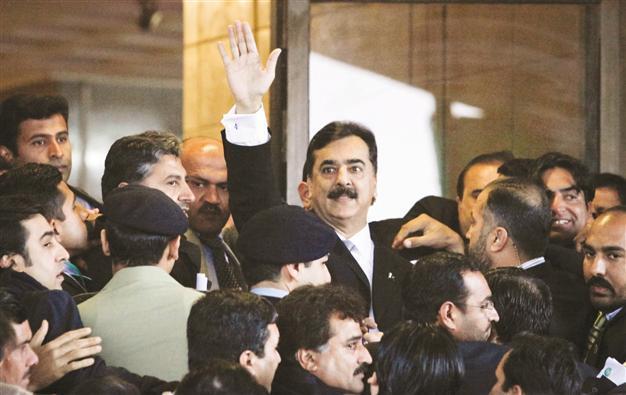Judicial coup in Pakistan as prime minister ousted
ISLAMABAD

Pakistan’s Prime Minister Yousuf Raza Gilani (C) waves after arriving at the Supreme Court in Islamabad in this February photo. Pakistan’s Supreme Court declares Gilani ineligible for office. REUTERS photo
Pakistan’s Supreme Court disqualified Prime Minister Yousuf Raza Gilani from office yesterday, in a stunning move likely to throw the country into fresh turmoil just months ahead of widely expected general elections.
The Court announced the move after convicting Gilani on April 26 of contempt for refusing to ask Switzerland to reopen a multi-million-dollar corruption investigation into President Asif Ali Zardari in a highly politicized case. “Yousuf Raza Gilani has been disqualified from being a member of Parliament,” Agence France-Presse quoted chief justice Iftikhar Muhommed Chaudhry as saying.
“He has also ceased to be the prime minister of Pakistan with effect from the same date [April 26]. Accordingly, the office of the prime minister shall be deemed vacant.”
Money laundering allegations“The Election Commission is required to issue notification of disqualification ... The president is required to take necessary steps under the constitution to ensure the continuation of the democratic process through the parliamentary system of government in the country,” he added. Zardari convened an emergency meeting following the decision.
Although the ruling itself is unlikely to bring down the government, it is likely to cause fresh uncertainty in a country already struggling with militancy and economic woes.
It could also hasten the date of the next general election. Fawad Chaudhry, an adviser to the prime minister, said Gilani would continue working as premier and that any final decision about his fate would be taken by the Parliament, according to the Associated Press. Gilani, Pakistan’s first ever sitting prime minister to be convicted, has recently faced widespread calls from the opposition to quit, saying that only Parliament could remove him from office.
Members of his government have accused judges of over-stepping their reach and of trying to bring down Gilani and Zardari before February 2013, when the administration would become the first in Pakistan to complete a full five year term in office.
Under the constitution, anyone convicted of defaming or ridiculing the judiciary is barred from being an MP.
Gilani subsequently decided not to appeal his conviction, in a move interpreted as an effort not to antagonize the court into disqualifying him. But senior opposition politicians, including cricket legend Imran Khan and former Prime Minister Nawaz Sharif, have challenged the ruling.
The allegations against Zardari date back to the 1990s, when he and his late wife, former premier Benazir Bhutto, are suspected of using Swiss bank accounts to launder about $12 million, allegedly paid in bribes by companies seeking customs inspection contracts. The Swiss shelved the cases in 2008 when Zardari became president.
coup,
